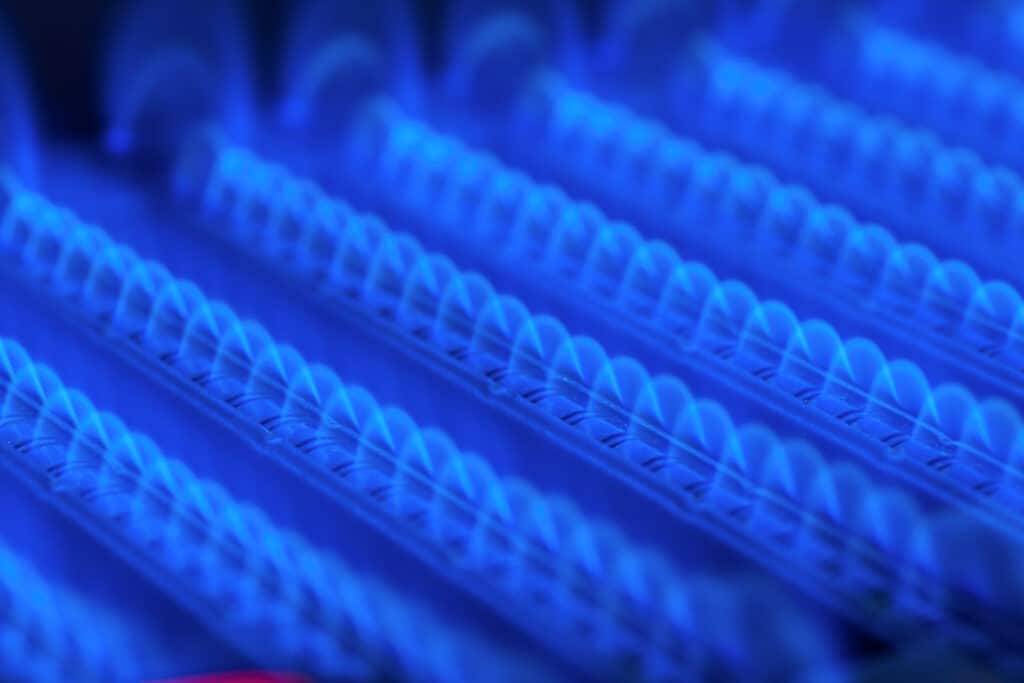A damaged boiler can lead to a number of different leaks and can pose a problem for your household. Take care of your unit by paying attention to how your boiler runs, especially before the winter begins. Even small changes are signs that your unit needs professional attention, and may possibly need to be replaced.
How Does a Boiler Work?
All boilers heat water that is used to keep our homes warm. However, not all boilers do this in the same way, which means the problems they present could vary.
Boilers vary in their fuel type, and the different types include:
Gas: uses a pilot light or an electric starter to ignite gas and oxygen in a combustion chamber, where gas is burned to produce heat, resulting in the warming of the heat exchanger and of your home.
Oil: similar to gas, but instead oil burns inside the combustion chamber to produce heat. Oil burners are typically more expensive than gas boilers.
Electricity: is typically used when the natural gas supply is not available. Electric boilers use electrical power to heat elements, which are then transfer heat directly to water. Electric boilers are the most expensive of the three different types.
Now that we know the different types of boilers, we can break down the full process of how a boiler works to heat your home:
Your thermostat senses a drop in your home’s temperature in comparison to the indicated temperature you’ve programmed and calls for the boiler to turn on.
Your boiler turns on and uses one of the three methods (gas, oil, electricity) to create heat.
The water inside the boiler heats up.
The heated water (or steam) is sent throughout your home through radiators or radiant floor systems. The steam gives off its heat to the air in your home.
As the water cools, it travels back to your boiler where it’s reheated and sent back out to continually heat your home.
Your boiler continues this process until your home reaches the desired temperature and your thermostat alerts it to turn off.
However, if your home is not heating, this process may not be so simple and could indicate that there’s a problem with your boiler or thermostat.
Signs Your Boiler is Malfunctioning
If your boiler isn’t working properly, it may display one of the following issues:
1. Leaking Water
Dripping water can cause a lot of property damage, and could potentially be dangerous to your health. Additionally, if your boiler is leaking water, it’s most likely using significantly more energy and has a higher risk of bursting. If you notice moisture or puddles near your boiler be sure to make an appointment with your technician.
2. Abnormal Smell
Gas suppliers add a sulfur smell to your boiler in order to make gas leaks more detectable. If you notice a metallic or egg-like smell near your boiler, you could potentially have a gas or oil leak.
Carbon monoxide is an extreme health hazard. To avoid any health and safety concerns, call a professional for an inspection immediately.
3. Inadequate Heat
If your home never seems to reach the temperature set on your thermostat, your boiler may be producing heat but unable to deliver it. Issues with heat delivery may be a result of short circuits in your thermostat or a buildup in your tank.
Before making a service appointment, check your thermostat settings while your boiler is running. If your home is still not heating, call for an appointment.
4. Delays in Heating
After switching your boiler on, you should notice heat being produced soon afterward. If it takes a long time for your boiler to heat up, you may have a circulation issue. The issue may be a single fix, or you may need to invest in a new unit altogether.
5. Faulty Power
If your unit is constantly turning on and off without warning, or it fails to run after turning it on, you may have a problem with your boiler’s power supply.
6. Unusual Sounds
One of the earliest signs of boiler damage comes from the noises your boiler may be making. A whirring, thumping, or whistling are all signs that your boiler could have some damage. Odd noises are usually a sign of a broken heater pump, a damaged heat exchanger, or a blockage in your system.
7. Your Boiler is Old
Similar to your air conditioner and other appliances in your home, your heater will not last forever. With proper maintenance, you can prolong the life of your unit. However, your boiler will wear over time and need repairs. Your unit may need new tubes or steel sections to get it running efficiently. Eventually, though, your boiler will need to be replaced.
Calling a Heating Professional
If your boiler is malfunctioning or broken, it’s important to call a technician as soon as possible.
Count on Essig Plumbing & Heating to provide you with the quality repairs and replacement services you deserve. As one of the most trusted heating service provider in Berks and Lehigh Counties since 1938, Essig has practically worked on every heating issue imaginable. Call (610) 557-3302 today or submit an online contact form to schedule an appointment for quality heating services in Reading.

